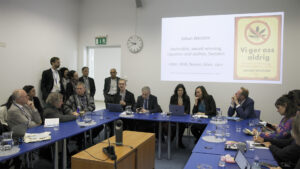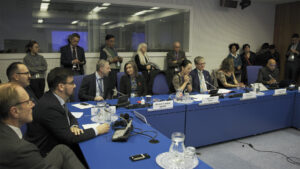Around seventy experts met under the flag of the Portuguese National Harm Reduction Network to discuss the state of Harm Reduction in Portugal.
In late November last year, the Portuguese National Harm Reduction Network – R3 – organised its third annual Conference on “Harm Reduction in a Crisis Context”, with around 70 participants, in the Portuguese city of Porto,.
R3 was founded in 2004 – a network of professionals and experts who represent around half of the Portuguese harm reduction projects intervening in drug use. Some of its main objectives are: to contribute to the development of effective and evidence-based practice; to promote knowledge sharing, and debate relevant issues for action; and to create favourable conditions for the participation of people who use drugs, in the decision-making and intervention processes.
During 2013, a number of harm reduction services were obliged to cease operations for several months. A new state body, SICAD, emerged (Intervention Service on Addictive Behaviours and Dependences), and the official structure responsible for implementing Portuguese drug policy changed, together with administrative and funding procedures.
At the conference, an R3 representative presented data on the state of play within Harm Reduction Services, specifically the funding for needle exchange programmes.
 At that point, future funding of 13 harm reduction projects run by Portuguese NGOs was not guaranteed, as the funding period ended in December 2013 and there was still no information about any request for applications to ensure continuity of these services. Furthermore, these projects were responding to the needs of around 2,300 clients, of whom 350 are enrolled in an Opioid Substitution Programme.
At that point, future funding of 13 harm reduction projects run by Portuguese NGOs was not guaranteed, as the funding period ended in December 2013 and there was still no information about any request for applications to ensure continuity of these services. Furthermore, these projects were responding to the needs of around 2,300 clients, of whom 350 are enrolled in an Opioid Substitution Programme.
Detailed discussions took place concerning the National Needle Exchange Programme managed by the Governmental General Health Directorate through the National HIV/AIDS Infection Program. Operational problems within the State Health Centres running them were revealed, after the management of the programs was changed at the end of 2012.
Earlier, in August 2012, the Portuguese national organisation (National Association of Pharmacies) responsible for managing the Needle and Syringe Program (NSP) in Portugal, informed the Government of their decision to abandon the program launched in 1993 to prevent HIV/AIDS. The contract between the Portuguese Government and the association expired on the 27th of November 2012. In response, the association intimated that they were no longer able to comply with the protocol, leaving the Ministry of Health responsible for finding a solution to the needle and syringe supply.
The National Association of Pharmacies, relying on its leftover stocks, informed the ministry that it would maintain the needle exchange program for drug users until December 2012, giving time for the government to find another partner to continue the project. The solution found was to move the program management to a governmental agency, the General Health Directorate, via the National HIV/AIDS Infection Program. Henceforth, the exchange sites would be run from Health Centres across the country, but also – maintaining the previous protocols and partnerships with NGOs – with the cooperation of local governments and any pharmacies still wishing to be involved.
According to the Portuguese DG Health and the National HIV/AIDS Infection Programme, since the framework agreement with National Association of Pharmacies ended, between January and September of 2013, 780.000 syringes were exchanged. About 87 percent of these exchanges were done by harm reduction services run by NGOs. More than half of the Health Centres informed the ministry that they have the materials needed to run an exchange program, but they don’t have access to clients. Additionally, the Portuguese Drug Users Association, CASO, announced at the conference that 10 Health Centres in Porto City/Region contacted by the Association didn’t have needle exchange programs in place. Moreover, a questionnaire done by the Portuguese Users Association, based on responses from 22 people who use drugs, revealed that 21 of the drug users don’t contact the Health Centres because of poor accessibility and fear of exposure.
After the presentation of this data, Portuguese Drug Czar, João Goulão, stated that the changes which resulted from the emergence of the new official structure, SICAD, implementing Portuguese drug policy, together with a need to reformulate legal and administrative procedures, have been creating barriers to the opening of calls for applications for Harm Reduction Projects in the field. Furthermore, to the surprise of the audience, he affirmed that SICAD would end the 2013 year with a financial surplus, reinforcing the impression that the changes in drug policy structures and management, as well as cuts in state officials working on this body, are acting as obstacles to a fully functioning new government system.
Almost one month after this conference, and 11 days before the end of 2013, one of the 13 HR projects, running a methadone maintenance programme, was invited to apply for funding, and the other 12 projects received an e-mail to sound out their interest in continuing to provide services. This was excellent news, which was followed by an announcement that government financial support for these projects would continue, and remain in place until new calls for applications in this area.
Recent data disclosed by SICAD (2013) revealed that heroin consumption in Portugal decreased during 2012. In this sense, as a pragmatic and humane framework for drug use, harm reduction and opioid substitution treatments have contributed to a comprehensive and inclusive response to the phenomena. Closing the doors to people who rely on harm reduction services will be disastrous, and will certainly compromise the progress made to date.
Joana Marques, Helena Moura and Marta Pinto
Source:
SICAD (2013). Relatório Anual 2012. A Situação do País em Matéria de Drogas e Toxicodependências. Retrieved in December 15 2013:
http://www.idt.pt/PT/IDT/RelatoriosPlanos/Documents/2013/relatorio_2012.zip







